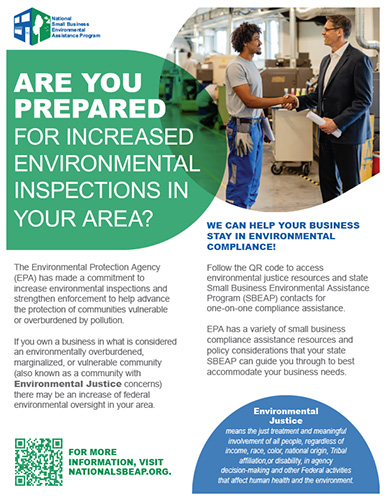What is Environmental Justice?
The U.S. EPA defines environmental justice as:
The just treatment and meaningful involvement of all people, regardless of income, race, color, national origin, Tribal affiliation, or disability, in agency decision-making and other Federal activities that affect human health and the environment so that people:
- are fully protected from disproportionate and adverse human health and environmental effects (including risks) and hazards, including those related to climate change, the cumulative impacts of environmental and other burdens, and the legacy of racism or other structural or systemic barriers; and
- have equitable access to a healthy, sustainable, and resilient environment in which to live, play, work, learn, grow, worship, and engage in cultural and subsistence practices
Small Business Environmental Assistance Programs, or SBEAPs, provide environmental compliance assistance to small businesses, many of which may be in communities with EJ concerns and may be owned by and employ members of those communities. It is essential that small businesses understand and comply with environmental regulations and reduce pollution, especially in overburdened communities. Small businesses that have questions or need free, confidential technical assistance can contact their state SBEAP for help or call 800-578-8898 to be connected to services.
EPA’s National Enforcement and Compliance Initiative
Beginning with the Federal Fiscal Year 2024, the EPA has recently published their enforcement and compliance initiatives that will run through Federal Fiscal Year 2027. These initiatives can result in increased environmental inspections in your area. If you need help with compliance, now is the time to schedule an on-site visit with your state SBEAP. Download the flyer below for more information or watch a short training explaining the EPA Initiative.
Your state SBEAP can help answer state-specific compliance questions, but the EPA also provides a variety of resources to assist in understanding and complying with federal environmental regulations as linked below.
- Basic information on enforcement – This resource, also available in Spanish, explains the basics of enforcement, including key terms such as legal standard, Burden of Proof and the EPA’s enforcement goals.
- Small businesses and enforcement – This page provides resources specifically designed for small businesses and communities with regard to EPA compliance.
- The small business compliance policy – This policy outlines the EPA’s approach to enforcing environmental regulations against small businesses, with a focus on encouraging compliance and promoting environmental protection. It applies to companies with 100 or fewer employees and offers a penalty waiver option for certain violations.
- Federal Fiscal Year 2022 enforcement and compliance results – This resource provides a summary of the EPA’s recent enforcement and compliance work, including data related to on-site inspections conducted in communities with potential EJ concerns.
Additional Related Resources
- Environmental Justice Thriving Communities Technical Assistance Centers – Provides support to empower underserved communities to address environmental justice concerns by building capacity in grant writing and management, navigating federal systems like grants.gov and sam.gov and guidance on community engagement.
- Community Navigators – Provides funding from the American Rescue Plan to organizations to act as hubs for reducing barriers that small businesses face accessing government resources for economic recovery. These “hubs” connect with networks of more local “spoke” organizations to provide assistance to entrepreneurs, especially in underserved communities.
- Federal Civil Rights Laws (Including Title VI) and EPA's Non-Discrimination Regulations –Explains prohibitions of discrimination for program and activities receiving federal assistance.
- National SBEAP EJ Subcommittee – This subcommittee meets monthly to discuss new EJ initiatives and learn how states can assist small businesses with these initiatives.
